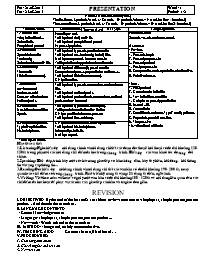Presentation - Week 1 - Năm học 2015-2016

Narrating events
Talking about daily activities
Talking about people's background.
Expressing opinions
Talking about types of special education
Talking about new technology in daily life.
Making arrangements for an excursion
Writing a letter of appointment/ confirmation
Bạn đang xem tài liệu "Presentation - Week 1 - Năm học 2015-2016", để tải tài liệu gốc về máy bạn click vào nút DOWNLOAD ở trên
Pre : 21.08.2015 Tea: 25.08.2015 Presentation Week: 1 Period: 1-2 (Total 37 weeks/ a school year.) The first term: 3 periods / week x 18 weeks = 54 periods/ a term. + (1week for the 1st term test) The second term: 3 periods/ week x 17 weeks = 51 periods/ a term. + ((1week for the 2st term test) Themes/topics Competences ['kɔmpitəns] N¨ng lùc Language focus 1. You and me A day in the life of... School talks People back ground Narrating events Talking about daily activities Talking about people's background. Expressing opinions Pronunciation: Sounds: Vowels and consonants. Grammar: - Review: 1. Present simple. 2. Present progressive. 3. Present perfect. 4. Past progressive. 5. Comparatives and superlatives of adjectives. 6. Relative clauses. - New: 1. Past perfect. 2. Gerund and to infinitive 3. To + infinitive as modifier. 4. Going to: expressing prediction. 5. Uses of will. 6. Zero article. 7. Conditional sentences: Type 2 and type three. 8. Reported speech: Questions. 9. The passive. 10. Adjective of attitude. 2. Education: Special education Technology School outdoor activities. Talking about types of special education Talking about new technology in daily life. Making arrangements for an excursion Writing a letter of appointment/ confirmation 3. Community: The media Life in the community. Talking about differently types of media. Comprehending newspaper articles/ radio news. Talking about life in the community. Giving directions 4. Nature and environment: Undersea world Conservation of nature. National parks. Talking about types of sea creatures and undersea life. Talking about national parks. Talking about protection of sea creatures, national parks and environment. 5. Recreation: Music, theatre and film. Sports. Talking about type of music/ film, play. Writing an informal letter of invitation. Giving a profile of a famous person. Talking about the world cup. 6. People and places: Typical English cities. Historical places. Giving information about some English cities. Talking about historical places. Interpreting statistics. Making a report. * The ways to learn: Môc tiªu cô thÓ: 1. Listening: Nghe hiÓu ®îc néi dung chÝnh vµ néi dung chi tiÕt c¸c ®o¹n ®éc tho¹i/ héi tho¹i cã ®é dµi kho¶ng 120 -150 tõ trong ph¹m vi c¸c néi dung chñ ®iÓm ®· häc trong ch¬ng tr×nh. HiÓu ®îc c¸c v¨n b¶n ë tèc ®é t¬ng ®èi chËm. 2. Speaking: Hái - ®¸p, tr×nh bµy mét sè chøc n¨ng giao tiÕp c¬ b¶n: híng dÉn, bµy tá ý kiÕn, hái ®êng, hái th«ng tin vµ cung cÊp th«ng tin... 3. Reading: §äc hiÓu ®îc néi dung chÝnh vµ néi dung chi tiÕt c¸c v¨n b¶n cã ®é dµi kho¶ng 190 - 200 tõ, xoay quanh c¸c chñ ®iÓm cã trong ch¬ng tr×nh. Ph¸t triÓn kü n¨ng tõ vùng: Sö dông tõ ®iÓn, ng÷ c¶nh. 4. Writing: ViÕt theo mÉu vµ/ hoÆc cã gîi ý mét v¨n b¶n cã ®é dµi kho¶ng 100 - 120 tõ vÒ néi dung liªn quan ®Õn c¸c chñ ®iÓm ®· häc hoÆc ®Ó phôc vô c¸c nhu cÇu giao tiÕp c¸ nh©n vµ x· giao ®¬n gi¶n. REVISION I. OBJECTIVES: By the end of the lesson Ss are able to review some tenses: simple past, simple present, present perfect And then do the exercises. II. LANGUAGE CONTENTS: - General knowledge: tenses - Language: simple past, simple present, present perfect ... - New words: Words related to the exercises III. METHOD: - Integrated, mainly communicative. IV. TEACHING AIDS: Grammar in use, Blackboard V. PROCEDURES: 1. Class organization: 2. Checking the old lesson: 3. New lesson: Teacher’s & Students’ activities Contents T: Asks Ss to remind some grammatical points Ss: Work individually. T: Provide the usage & some adverbs (evidences) to identify the tenses I. GRAMMAR: * The simple present: S + Vs/es S + do/does + not + V (bare inf) Do/does + S + V (bare inf)? * The present progressive: S + am/ is /are + V-ing S + am/ is /are + not + V-ing am/ is /are + S+ V-ing ? * The present perfect: S+ have/ has + V3( pp)/ ed S+ have/has + not + V3( pp)/ ed have/ has + S + V3( pp)/ ed? * The simple past: S + V2/ed S + did + not + V (bare-inf) Did + S + V (bare inf)? * The past perfect: S + had + V3( pp)/ ed S+ had not + V3( pp)/ ed had + S + V3( pp)/ ed ? T: Asks Ss to present the answers in front of the class. Ss: Individual work. Some Ss present. Others listen to. T: Corrects Ss’ mistakes. II. EXERCISES SUPPLY THE CORRECT FORM OF VERBS 1. We (to be) teachers. 2. I (meet).. ARTHUR three weeks ago. 3. She (be). born in 1980. 4. What you (do) at 6.p.m yesterday? 5. He (write) a book since last year. 6. The bell (ring). while Tom (take) a bath. 7. What .you (do) yesterday? 8. She (run) now. 9. Hurry up! The train (come). 10.Up to now, the teacher (give) our class 5 tests 11. I (not meet) him for one year. 12. My friend (study) English for an hour every night. 13. Mr Brown (travel).. by air several times in the past. 14. Be quiet. The baby (sleep) . * Key: 1. are 2. met 3. was 4. were – doing 5. has written 6. rang – was taking 7. did – do 8. is running 9. is coming 10. has given 11. haven’t met 12. studies 13. has travelled 14. is sleeping 15.
Tài liệu đính kèm:
 Review.doc
Review.doc





